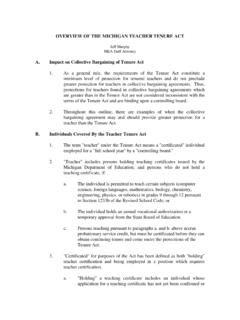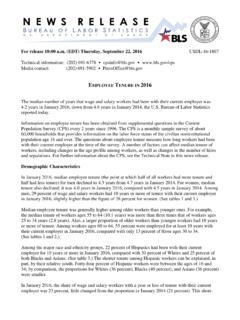Transcription of Tenure reform rev - Chartered Institute of Housing …
1 The practical implicationsof Tenure reformChartered Instituteof your work is our businessThe Chartered Institute of HousingThe Chartered Institute of Housing (CIH) is the professional body for people involved in housingand communities. We are a registered charity and not-for-profit organisation. We have a diverseand growing membership of over 22,000 people both in the public and private sectors living and working in over 20 countries on five continents across the world. We exist to maximisethe contribution that Housing professionals make to the wellbeing of communities. Our vision is to be the first point of contact for and the credible voice of anyone involved or interested in Housing . Chartered Institute of Housing Octavia House, Westwood Way, Coventry, CV4 8JP Tel: 024 7685 1700 Email: : Debbie Larner, Head of Practice and David Pipe, Policy and Practice OfficerWith legal input from: Anthony Collins SolicitorsChecked for accuracy by: The Department for Communities and Local Government Copyright: Chartered Institute of Housing August 2011 Registered charity No.
2 244067/RCover photograph by all reasonable care and attention has been taken in compiling this publication, the authors and the publishersregret that they cannot assume responsibility for any error or omission that it contains. All rights reserved. No part ofthis publication may be reproduced, stored in a retrieval system or transmitted in any form or by any means,electronic, mechanical, photocopying, recording, or otherwise without the prior error or omission of the practical implications of Tenure reformThis practice briefing sets out the implications of Tenure reform for tenancy management. The Government is introducing: The ability for Housing associations and local authorities to offer fixed term tenancies An affordable rent model which will enable eligible Housing providers (those with a deliveryagreement with the Homes and Communities Agency) to set rent at up to 80% of local marketrents, both on a proportion of their existing re-lets and on new build from July 2011 this willbe used to fund new development.
3 These reforms are being implemented through the Localism Bill and through changes to theregulatory standards framework. The practical implementation is subject to change as both aresubject to amendment following Report stage in the House of Lords and consultation on the draftdirections to the Social Housing Regulator (respectively). Up-to-the-minute updates will beavailable via Practice Online the online good practice resource for timescales for reform July 2011 The Homes and Communities Agency (HCA) announced which providers havereceived funding for new development under their Affordable Homes Programme. Housingassociations who have received funding are able to begin using fixed term tenancies foraffordable rent immediately July 2011 The Department for Communities and Local Government (DCLG) launched aconsultation on new directions to the Tenant Services Authority (TSA). It includes proposals forchanges to the Tenancy Standard which would allow all Housing associations and localauthority landlords to offer fixed term tenancies in the future September 2011 The government s consultation closes.
4 Following this DCLG will instructthe TSA to make changes to their standards. The TSA will then carry out a further consultationon the detail of those changes November 2011 The Localism Bill is expected to gain Royal Assent January 2012 Localism Bill provisions requiring local Housing authorities to prepare andpublish a tenancy strategy within 12 months come into force. In practice these should be welldeveloped by April 2012 so they can provide the strategic framework for landlords tenancypolicies 1 April 2012 Revised regulatory standards come into effect and main Tenure reformprovisions of Localism Bill come into force. These changes are expected to allow housingassociations and local authority landlords to offer fixed term tenancies both on social rent andaffordable rent properties3 From 1 April 2012 Housing associations and stock-holding local authorities will be expectedto develop and publish tenancy policies, and will not be able to grant fixed term tenancies ongeneral needs, social rent properties until they do practice briefing covers.
5 Fixed term tenancies The relationship between fixed term tenancies and affordable rent Tenancy strategies and tenancy policies Use of starter tenancies or introductory tenancies The Right to Buy/Right to Acquire and fixed term tenancies Succession and fixed term tenancies Transfers, mutual exchanges and fixed term tenancies Ending a fixed term tenancy Possibility of term tenanciesThe term fixed term tenancies is used to apply to all tenancies that are offered for a specifiedperiod of time, as opposed to traditional lifetime tenancies . Following a revision to the draft Directions to the Social Housing Regulator consultation issued by the Housing Minister on28 July, providers will be required to offer fixed term tenancies for at least 5 years, except inexceptional circumstances. The exceptional circumstances where fixed term tenancies may beoffered for less than 5 years, but no less than 2 years must be set out in the landlord s Directions to the Social Housing Regulator consultationcloses on 29 this section will explain, the exact form of tenancy used will vary depending on whether theprovider offering it is a local authority or a Housing authoritiesFollowing the commencement of the Localism Bill (expected to be April 2012) a new type oftenancy called a flexible tenancy will be available to local authorities.
6 Flexible tenancies will be fora fixed term with similar rights to secure tenancies during the fixed term. 4 Generally, tenants on a flexible tenancy will have the same rights as secure tenants (as set out inHousing Act 1985), including the Right to Buy after a qualifying period, and the Right to same grounds for possession will all be available and could be used during the fixed term, for example if there were rent arrears or a breach of tenants will not however have a statutory right to improve their properties or becompensated for those improvements. All new secure and flexible tenancies will only have astatutory right of succession to a spouse/partner and not also to family members. Existingtenants right to succession will not be affected. These changes are set out in more detail later in this briefing (see page 11).When flexible tenancies are available they will only be used where local authorities chooseto doso. They will also only be available to new tenants.
7 The rights of existing secure and introductorytenancies are associationsCurrently Housing associations cannot generally offer fixed term tenancies at a social rent asregulation requires that they offer and issue the most secure form of tenancy compatible withthe purpose of the Housing and the sustainability of the community . This effectively requiresproviders to grant lifetime tenancies to the vast majority of new tenants in general needs, socialrent Housing . However, a revision to the Tenancy Standardin April 2011 enables Housing associations tooffer fixed term tenancies at an affordable rent as part of a contract with the HCA to deliver newhomes under the Affordable Homes Programme. Furthermore, the Directions to the Social Housing Regulator Consultationissued by DCLG inJuly 2011 contains a provision to make changes to the current Tenancy Standard removing therequirement that providers offer the most secure form of Tenure compatible with the purpose ofthe Housing and the sustainability of the is proposed that this be replaced with a requirement to offer and issue tenancies which arecompatible with the purpose of the Housing , the needs of individual households, the sustainabilityof the community and the efficient use of their Housing stock.
8 If approved in this format (the consultation closes on 29 September 2011) Housing associationswill also be able to offer fixed term tenancies to any newtenants, but only if they chooseto doso. It is anticipated that tenancy policies will need to address these regulatory requirements andthe circumstances when different types of tenancy are most likely to be is currently no legal mechanism for local authority landlords to grant fixed term the Localism Bill provides for a new type of secure tenancy for a fixed term a flexibletenancy. Housing associations do not need a new type of tenancy to grant fixed term tenancies. Fixedterm assured, periodic assured shortholdand fixed term assured shortholdcan all, strictlyspeaking, be used for this purpose. However there are some considerations to be aware of whendeciding what tenancy agreement to use. Fixed term assured tenancy if the fixed term expires and the landlord has not gone through thecorrect procedure to end the tenancy, the tenancy automatically becomes a periodic assuredtenancy and the landlord can then only end the tenancy using one of the grounds for possessionset out in the Housing Act 1988.
9 The tenant could end the tenancy with a valid notice to assured shorthold tenancy this is the standard AST that Housing associations currentlyuse. It can be ended by either party using a valid notice to quit. It could be argued that thistherefore provides a tenant with a lesser degree of security than a fixed term tenancy. Note: if either a periodic assured or a periodic assured shorthold is used for an affordable rent,this presents a challenge in relation to rebasing the rent at the end of the fixed period. This isbecause rent can only be rebased once a fixed term tenancy comes to an end and a new tenancyis issued (either to the same or a different tenant). If a periodic assured (or assured shorthold)tenancy is used, and the tenancy is renewed the tenancy does not effectively come to an tenancy option is chosen, they will need to be managed very differently when used tooffer a fixed term tenancy. Most notably, the provider will need to create mechanisms forreviewing the tenancy before the end of the fixed term (see page 13).
10 We recommend that where Housing associations choose to offer a tenancy for a fixed term, theyuse an assured shorthold tenancy, expecially if the tenancy is let at an affordable , there are also some important issues that Housing associations need to be aware of inrelation to assured shorthold fixed term tenancies:Grounds for possession The tenancy terms themselves have to reflect the grounds for possession. There is a specificstatutory provision in section 7 of the Housing Act 1988 that only allows possession on a fixedterm assured tenancy to be ordered on a certain ground if the tenancy terms expressly refer to that ground. So, for example, for a landlord to be able to rely on ground 14 (anti-socialbehaviour), that ground needs to be included in the tenancy agreement. 6 Housing associations using assured shorthold fixed term tenancies need to be aware of this andto ensure that they include all of the relevant grounds for possession in their tenancy it stands currently, certain grounds for possession are not available at all.














